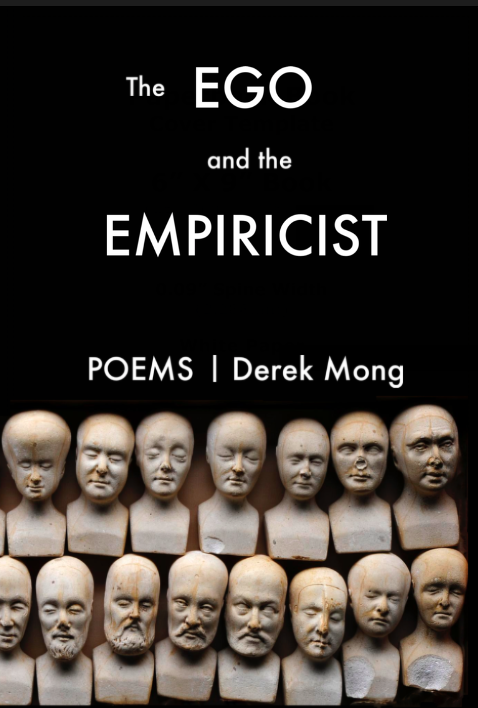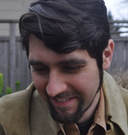The Ego and the Empiricist by Derek Mong is the finalist for the Two Sylvias Press Chapbook Prize.
Praise for The Ego and the Empiricist:
"Whatever I take from this forest floor," writes Derek Mong in this gorgeous new chapbook, "I borrow." And, true to this statement, Mong adeptly gathers a wide swath of source material and produces poems that honor their origins, spring off from them, and, ultimately, give back. As Mong explores the journey of the body over time, his lines are both charged and solemn, with turns of phrase at once unpredictable and spot-on. This is a haunting, riveting collection.
— Natalie Shapero
A reader can open any contemporary journal of poetry and quickly pick up characteristics of the current mode. If the magazine is serious you’ll also find good poems, and many more bad ones, and what falls between—the largest group. In this our age is like any other. Derek Mong’s The Ego and the Empiricist, though its music is very much of our moment, takes as starting point poems and poets distant in time and worldview, and from first poem to last the difference is stunning. Mong has made of original medieval and renaissance works a grouping of wholly transformed new poems that sound contemporary, but retain the urgent intimacy of un-ironic spiritual “exercises,” as the Jesuits might have it. As I read I began to think of these poems as a new species of retablos, with verbal objects in the place of iconic imagery. There is the same naïve, unmediated closeness of address to Christ—“You’re smoke, you’re/ thunder’s anti-static rope,” the same heuristic feel to the pieces, as if intentionally made for devotional purposes. How strange! Not since Lowell’s Imitations ( which Mong acknowledges in his notes) have we had a grouping of poems so alien in tone and tilt to the current secular mind brought into contemporary American idiom, fully alive, fully human. And human they are; these are not the words of the elevated or pious: “Still, I can’t explain my fear/ of flies, nor the time I beat a man for smiling.” There is everywhere an offhand grace, “Later a green glow, like the inside of a swept cape,/ hung where the sun crossed the bay,” coupled always with the modesty of a true religious—“I am still building a theory for just what that means.” I can hardly say how much I like these poems, which are shocking for all the unusual reasons.
— Jeffrey Skinner
A poetry of transformation, The Ego and the Empiricist blurs the space between translation and homage, and shapes a free-ranging and symphonic landscape populated by monks, farmers, philosophers, bees, and all manner of amazements. In making lost voices come alive again, Derek Mong demonstrates the poet's most profound skill: the gift of speaking in tongues.
— Ann Townsend
Sample Poem:
In the Shadow of a Scrivener’s Quill
Over the O, the ah, the fable’s lazy start, its Once
Upon a Time; over the gild-work and into the text block, past
the signatures and spine; over the names
remaindered from distant shores which you swept
up and relined; over the we, the she, the I; over
the cattle carts clacking on cobblestones,
dead prayers, lost plays, gun-free melees,
and the other sounds those foreign consonants retain--
over the footnotes, toward the fore edge, through
the marginalia that’s raining down the vellum’s white,
inviting frame; over the gaps which absent words
plant into the lines; over the cloth
that holds your place; over the ink that’s dried;
over the flesh and under the hide of enough
animals it’s said whole herds passed
through your hands; over the grooves
your newest word still shines inside, past the pages
bound face-to-face, revised; over the stories,
all the oldest ones, which—like light we skim
from distant stars—renders our hurtling less lonely;
over the eons, inside the authors, onto an easel
and into your inkwell, the shadow of your scrivener’s quill
is dancing, dark foot dipped into a darker pool, it lifts
a load of sweet, unfiltered evening
then lands, black dash to reattach the past,
and coax us up the learning curve we climb
by generations. O monk or scribe
who curled his back inside candlelight, I’ve often
questioned your motives: did penitence push
you to push books into the dark beyond--
stepping stones you leapt toward St. Peter’s ledger--
or was scribe work just an exercise in exercising options?
Take that candle for life’s defining metaphor
and the tomes you shelve begin
to resemble heaven. Perhaps you were seduced
enough to change them, as when chaperones
left alone too long imagine misbehaving?
Or did anonymity only remind you
of the pleasures it offered in compensation: to live
for months inside Homer’s head, bundled
up in one-word increments; to touch the word
of God, put it down in red, before returning
to a relay team that runs for centuries
untended? One day our world will call you up
again, place into your hands our scraps
of self, and ask you to arrange the parts
that make us sharp, redeeming. For now may you
swim inside our memory, rippling unnoticed.


